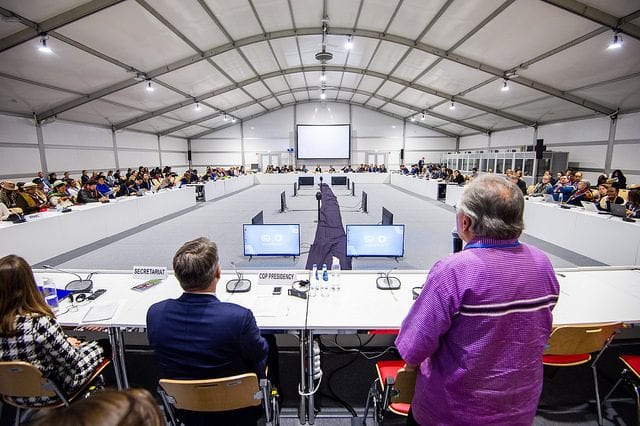Because of their close connection to the natural world, indigenous peoples are among those most affected by climate change, despite their negligible carbon footprint. Recognizing that indigenous homelands and ways of life are threatened by climate change, the National Congress of American Indians and the Native American Rights Fund have joined the community of nations in climate change negotiations at the United Nations Framework Convention on Climate Change (UNFCCC).
For the past two weeks, negotiations under the UNFCCC have been taking place in Katowice, Poland, at the 24th Conference of the Parties (COP 24). The Paris Decision, which adopted the Paris Agreement at COP 21, also established a Local Communities and Indigenous Peoples Platform to provide an opening for traditional knowledge to influence climate policy at local, regional, and international levels. While the platform was established at COP 21, the implementation has been incremental. An historic step forward in implementing the platform was taken at COP 24. Working closely with the International Indigenous Forum on Climate Change, the Subsidiary Body for Scientific and Technical Advice established a Facilitative Working Group, which will develop a work plan for the platform. The COP approved the decision on Thursday, December 13.
The working group will have fourteen representatives, seven country representatives and seven indigenous representatives appointed by indigenous peoples (one from each of the seven regions of the world). This representation of indigenous peoples is unprecedented, marking the first time that indigenous representatives (chosen by indigenous peoples) will participate on an equal basis with states within a United Nations body.
Ultimately, the platform will institutionalize dialogue between states and indigenous peoples, foster indigenous participation in the discussions on environmental policy, and encourage a holistic response to climate change. According to a statement from the UN:
Indigenous peoples constitute less than five percent of the world’s population, but they safeguard 80 percent of the world’s biodiversity. The global response to climate change requires applying all of the best knowledge available, including the perspectives of indigenous peoples and local communities at the front lines of climate change. Indigenous peoples are not only among the most vulnerable to its impacts, but they also hold many of the solutions to adapting to climate change.
Read more about NARF’s work at the United Nations Framework Convention on Climate Change.

More blog posts


